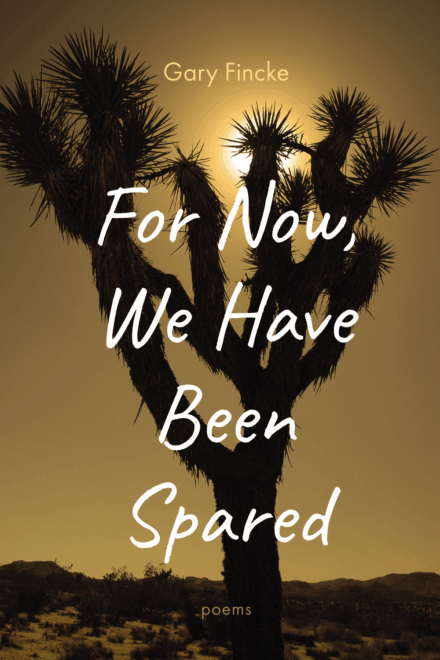I’m thrilled to feature one of my favorite people and writers today on What Scares You. Gary Fincke, or Dr. Fincke, as I’ve called him most, was one of my writing professors at Susquehanna University and solidly one of the reasons I’m still a writer today. He’s not only an excellent writer but a fabulous teacher as well, one of the good ones who is concerned about figuring out what a student is trying to do and help them get there.

Dr. Fincke has published twelve collections of stories, including Sorry I Worried You, winner of the Flannery O’Connor Prize and The Killer’s Dog, winner of the Elixir Press Fiction Prize. His stories have appeared in such journals as The Missouri Review, The Kenyon Review, Black Warrior Review, CrazyHorse, The Idaho Review, and Cimarron Review. His most recent flash collection is The History of the Baker’s Dozen (Pelekinesis 2024). His newest book is For Now, We Have Been Spared, a collection of poetry published in March by Slant Books. He is the Emeritus Charles Degenstein Professor of English and Creative Writing at Susquehanna University, where he founded and then directed the Writers Institute and the nationally recognized undergraduate creative writing major for more than two decades.
And now? Let’s find out what scares him…
What is your earliest childhood memory of fear?
My earliest memory of fear is being afraid of rain falling on my bare head. There, that identifies me as born squeamish. I was four and walking with my mother when it started to rain. I still had a toddler’s lisp, so I insisted “I’ll fry” if my head got wet. My mother walked me into the A&P and coaxed a cardboard box from the manager. I wore it all the way to my grandmother’s house, square-headed as a primitive robot. My kindly grandmother set the box aside and patted my head. My aunt, who also lived there, looked at me as if she had work to do to make a man out of me.
My earliest “earned fear” arrived when I was five and playing a few blocks from home with a girl who lived in a house near the railroad tracks. Three older boys, maybe ten or eleven, emerged from where a creek ran on the other side of the tracks, then crossed and stood us against the back door of a house and terrorized us by firing BB guns over our head. The girl cried. I did my manly best by not saying a word. Not then. Not ever. But we never played together again.
What is your dumbest fear?
More confessions from childhood. I was seven, and my aunt, the one who used the word pantywaist on me when I showed any signs of regressing back to being afraid of getting my hair wet, told me a story about ants crawling up a friend’s nose while she fell asleep on a backyard sunbathing blanket. The ants, she said, made an ant hill in her head. You’d think a bright 2nd grader with all As on his report card could distinguish between fact and fiction, but all that summer I worried about ants invading me. Every tickle caused by tiny insect feet made me brush myself off with the sort of fury required for a swarm of bees. Thirty years later, I wrote a poem about it that was eventually selected to become a poster for a series produced by Penn State. Even better, that incident and a character based on my aunt became the opening scene of a story called “Rip His Head Off” that helped the story collection Sorry I Worried You win the Flannery O’Connor Prize.

“My aunt told me a story about ants crawling up a friend’s nose while she fell asleep on a backyard sunbathing blanket.”
What are your phobias?
I’m absolutely phobic about heights. The third step on a ladder is my limit. I’ve never reached the top of the playground monkey bars. I once froze on the staircase that leads up to the exit from Mammoth Cave, convinced another step would somehow cause me to pitch over the railing. My wife coaxed me onward and upward in a tone reminiscent of my aunt’s. Years later, in a more resigned tone, she said, “Please don’t stop” when I panicked driving up the cliffside road to Los Alamos, the car as safe as I could make it by downshifting to second gear, a sort of funereal line of cars behind me.
The only time my phobia seemed like sanity was when my friend the writer Robert Boswell drove us up a narrow, no-guardrail road to reach the waterfall above Telluride. I could not see even an inch of road when I looked out the window of his jeep. I chanted to myself, “He brings his children up here,” as if that made it safe. To my eternal gratitude, he later said, “You’re not the worst,” which, it turned out, was a friend of his who had beaten me for that prize by literally curling up on the floor.
Who is your favorite monster/villain?
Dr. Strangelove. I was a senior in high school when I saw that movie, less than a year removed from living through the Cuban Missile Crisis, especially that DEFCON 2 weekend that began when our Problems of Democracy teacher inadvertently said “Goodbye” at the end of Friday’s afternoon class. (I put that scene in a story called “The Selfishness of Bravery.”
I grew up with nuclear attack drills, not the ridiculous crouch-under-your-desk ones you can watch on YouTube, but ones that seemed more serious because in grade school we walked downstairs to the school basement, faced the wall, and held that position for maybe thirty seconds. I always looked to see if everyone was doing it, and sure enough, until junior high began, everybody did. I’ve watched Dr. Strangelove lately, and it’s even more unsettling because the satire now seems mild. Or even missing, as if 2025’s reality had dimmed all of the exaggerations, especially the Nazi salutes and hallucinatory conspiracy theories.
What is your greatest fear? Do you have a recurring nightmare? What was your worst nightmare ever?
I put all these questions together because there’s a connection, at least to me. The recurring one, since childhood and maybe once or twice or more a year ever since, is “Falling Up.” I rise in the dream until I am about to disappear, and I often wake up crying out. Ask my wife how that sounds. Basically, it’s as if, rather than falling and being injured or killed, I fall up and vanish, which, if it isn’t my greatest fear, it’s gaining fast as I close in on eighty years of age. How do I deal with it? Self-deprecation comes in handy. Here’s where my aunt looks over my shoulder and whispers “pantywaist.” And that fear of vanishing has kept me writing and teaching well past (nine years now) when I retired.
And the worst of those nightmares? In that one, I was driving along the Susquehanna River shortly after taking my job at the university, and the car went out of control, through the guardrail and flew up rather than plunge into the water. Regardless, I was about to die/vanish, and this time I uttered a full-throated scream. I remember it more clearly than the others because I was living temporarily in a spare room of the department chair’s house, and I was sure that he and his wife and his two teenaged daughters heard me. (I wrote a poem about that, too) I’ve traveled that section of road a thousand times since, and when I am a passenger I always, as the car approaches that spot, feel anxious.

